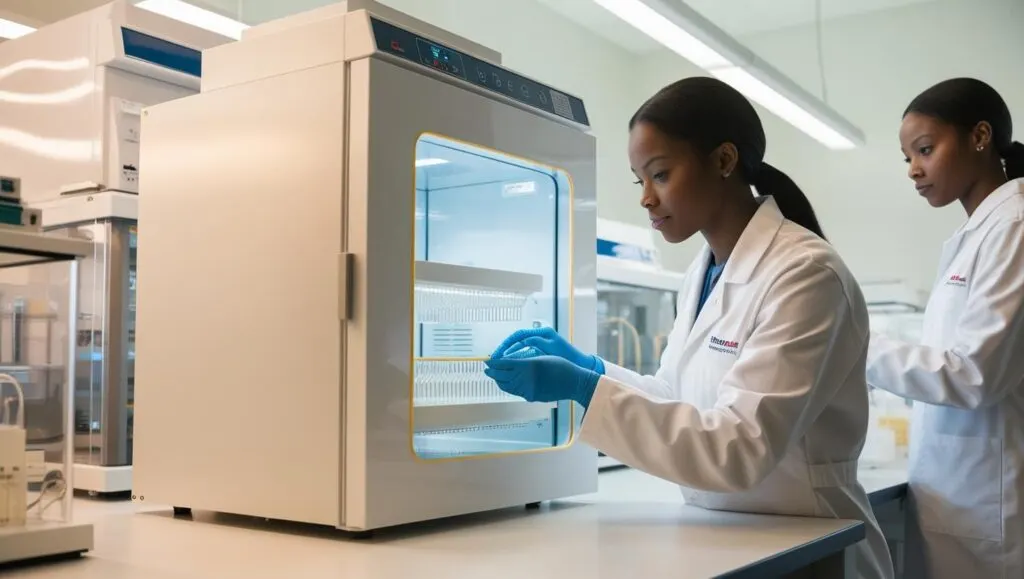Laboratory incubators play a vital role in creating controlled environments necessary for experiments in microbiology, cell culture, pharmaceutical testing, and food safety. To make the best choice, it’s essential to understand the key specifications of incubators, their application differences, and the crucial factors to consider during your selection process.
In this article, we will walk you through the types of incubators, their technical specifications, and how to choose the right model for your laboratory. Apex Scientific is your trusted supplier of laboratory equipment in South Africa, offering a wide variety of incubators to meet your needs.
1. Understanding the Different Types of Laboratory Incubators
1.1 Natural Convection vs. Forced Convection Incubators
When choosing the perfect incubator for your lab, understanding the difference between natural convection and forced convection is key.
- Natural Convection Incubators: These incubators use natural air circulation for heat transfer, offering a uniform temperature with minimal airflow. They are ideal for sensitive applications like microbiology, where airflow could disturb samples.
- Forced Convection Incubators: These models use fans to circulate air for faster heat distribution. This improves temperature recovery when the door is opened and ensures uniform heat control for more demanding applications like pharmaceutical stability testing.
Key Tip: If you are working with delicate samples, a natural convection incubator may be best. However, for applications requiring precise, rapid temperature control, consider a forced convection incubator.
1.2 Heating vs. Cooling Incubators
- Heating Incubators: Typically maintain temperatures from ambient +5°C up to 80°C. They are ideal for applications such as bacterial growth or biochemical reactions.
- Cooling Incubators (Refrigerated Incubators): Maintain temperatures below ambient, usually between 4°C and 60°C. These are perfect for storing biological samples or conducting plant growth studies.
2. Understanding Temperature Control and Accuracy in Incubators
Temperature accuracy is crucial for reproducible results in your laboratory experiments.
2.1 The Role of Accuracy in Incubator Selection
When selecting an incubator, pay attention to:
- Temperature Uniformity: Forced convection models typically offer superior temperature consistency across the chamber.
- Temperature Stability: Look for models that maintain the set temperature without fluctuations.
- Temperature Control Precision: High-quality incubators offer precise control, which is essential for sensitive experiments.
2.2 Understanding Temperature Control Ranges
The control range of an incubator is typically listed as:
- Ambient +5°C to 80°C for heating incubators
- 4°C to 60°C for cooling incubators
It’s essential to note that ambient +5°C means the incubator can operate at temperatures 5°C above the current room temperature, not a fixed 5°C minimum.
3. Key Factors to Consider When Choosing an Incubator
3.1 Capacity and Chamber Size
Ensure the incubator is large enough for the number of samples you plan to incubate. Check the internal dimensions to confirm compatibility with your containers.
3.2 Shelving and Interior Design
Adjustable shelving is important for flexibility, especially when incubating various sample sizes. Stainless steel interiors are easier to clean and more durable.
3.3 Safety Features
Look for models with:
- Over-temperature protection to prevent overheating.
- Alarms and monitoring systems for temperature deviations.
- Glass doors or viewing windows for easy sample observation without disturbing conditions.
3.4 Energy Efficiency
Cooling incubators tend to use more energy than heating-only models. Opt for energy-efficient designs to keep running costs low while maintaining stable conditions.
3.5 Optional Features and Accessories
Some incubators offer specialized features such as humidity control, programmable controllers, and data logging for compliance with regulatory standards like 21 CFR Part 11.
4. Application-Specific Considerations
Different applications demand specific features from an incubator.
4.1 Microbiological and Bacterial Culture Growth
Requires stable, consistent temperatures, typically around 37°C for human-pathogen studies. Natural convection incubators prevent sample drying, making them ideal for this use.
4.2 Pharmaceutical and Stability Testing
These applications demand precise temperature control and minimal deviation, making forced convection incubators a preferable choice. Compliance features like 21 CFR Part 11 are also crucial in these settings.
4.3 Food Safety and Quality Testing
Reliable heating and, in some cases, humidity control are necessary to ensure consistent microbial analysis.
4.4 Plant Growth and Environmental Testing
For temperature cycling studies, a cooling incubator is necessary to maintain the required environmental conditions.
5. Selecting the Right Incubator for Your Needs
When purchasing an incubator, consider:
- Your specific application needs (temperature range, convection type).
- The level of accuracy and uniformity required.
- The internal capacity and design.
- Extra features such as alarms, humidity control, or data logging.
- Regulatory requirements like 21 CFR Part 11 compliance for pharmaceutical environments.
Explore Our Range of Incubators at Apex Scientific
At Apex Scientific, we offer a range of high-quality incubators to meet your laboratory needs. As a leading supplier of laboratory equipment in South Africa, we stock incubators from top manufacturers like Jeiotech and Being International.
Some of the incubators we carry include:
- Jeiotech Incubators, featuring optional 21 CFR Part 11 compliance for GMP audit readiness.
- Being International Forced Air Incubators, perfect for applications requiring rapid and uniform temperature control.
- Being International Natural Convection Incubators, ideal for sensitive microbiological applications.
- Being International Cooling Incubators, suitable for stability testing and plant growth studies.
For expert advice on choosing the right incubator for your laboratory, contact Apex Scientific today. Our team is here to guide you through the selection process to find the best incubator to fit your specific needs.




